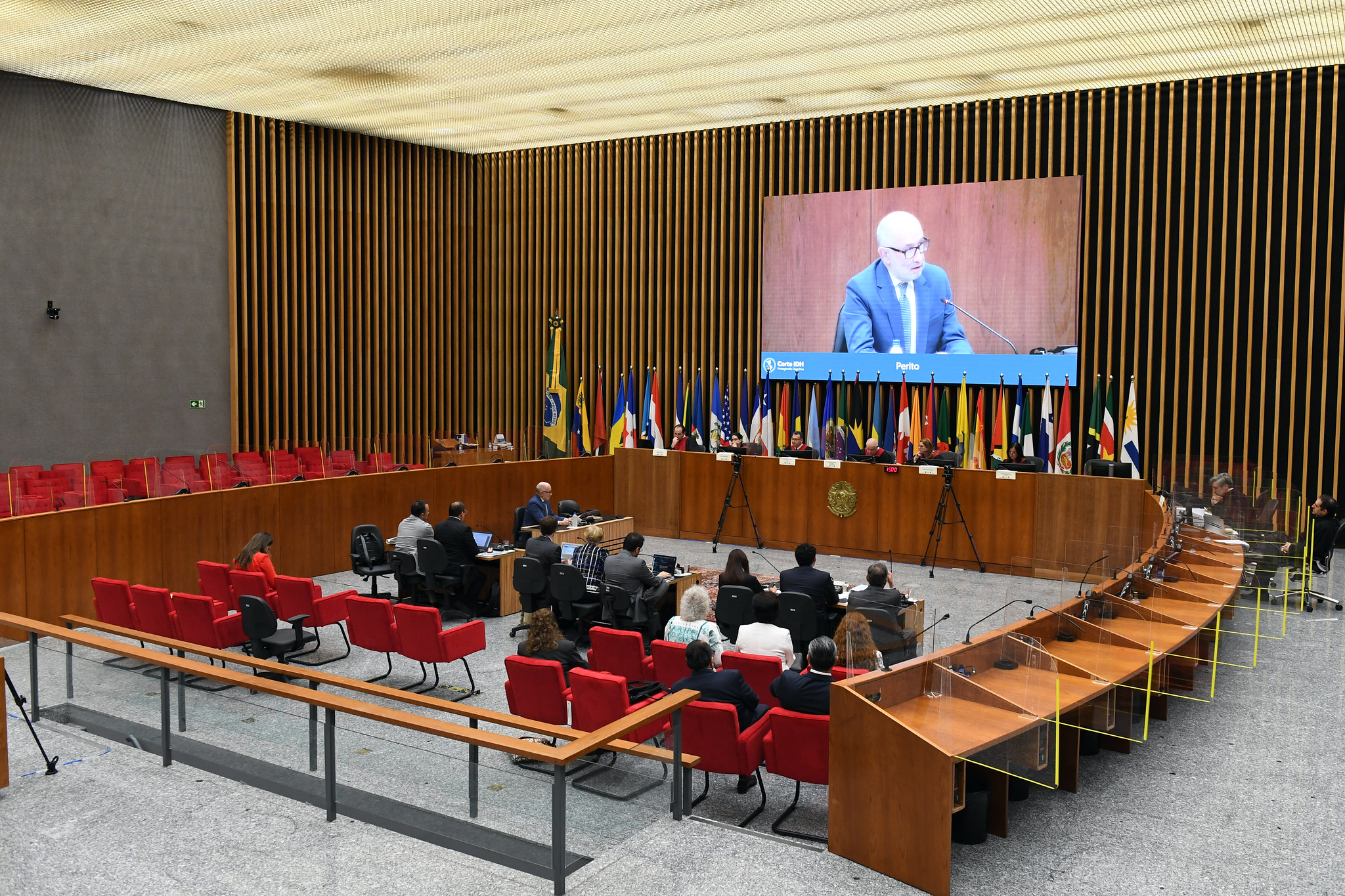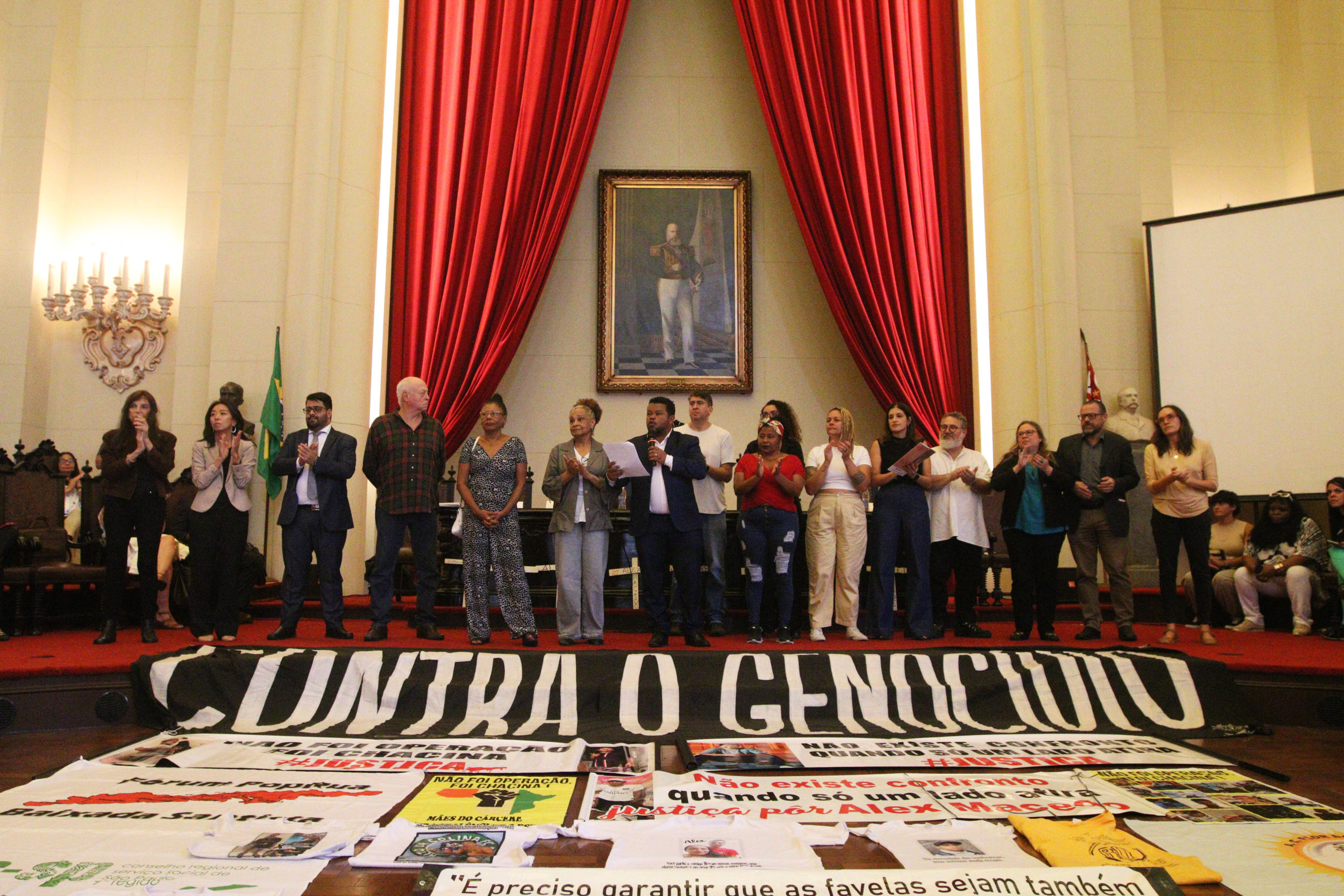Ban on abusive searches advances in Congress
In a public hearing, sponsor pledges to vote Bill 7,764/2014 before legislative recess

Considered both humiliating and ineffective, the abusive search affects millions of prisoners’ family members, who are forced to undress, squat repeatedly over a mirror and submit to an anal and vaginal inspection before visiting their relatives. A mirror was placed on the floor at the entrance to the Commission by civil society organizations to raise awareness among lawmakers of the violence of the procedure. Also participating in the session were officials and experts from the states of São Paulo, Rio de Janeiro, Minas Gerais, Goiás and the Federal District.
Click here to watch the hearing in full.
“Brazil already has at least 11 pieces of legislation that establish complete bans on the procedure, by forbidding nudity and genital inspections. Among them are the laws approved in São Paulo and Rio de Janeiro,” said Vivian Calderoni, a lawyer for the Justice program at Conectas, at the hearing.
The government of São Paulo, the state that holds 36% of the Brazilian prison population, signed the law in August 2014, but it has yet to be implemented. Data from the São Paulo Prison Administration Department show that more than 402,000 men and women were registered to visit the state’s prison facilities in September 2013. Nearly 82% are women, adolescents and children.
According to Calderoni, the situation will continue until there is a federal law that standardizes the rules on the matter. “The country is already in the process of abolishing the practice. It’s now up to the National Congress to see this process through, by standardizing the procedure across Brazil,” she added.
“For several years now, Brazil has suffered successive international embarrassments for continuing to routinely conduct these abusive searches,” said Raquel Lima, a researcher for ITTC (Land, Employment and Citizenship Institute). She explained that both the UN and the OAS already equate nudity and these searches with torture.
“May this hearing be the first step so that one day, in the very near future, we can look back and feel ashamed that we used to permit these abusive searches in the country, just like we feel now about slavery,” said Lima.
The hearing was also an opportunity for people to voice opinions against banning the searches, such as Tulio Caiban Bruno, a prosecutor from the Rio de Janeiro State Prison Council. According to him, a ban could increase the amount of contraband entering prisons. However, his argument was contradicted by the prosecutor Haroldo Caetano, from the Public Prosecutor’s Office of Goiás – a state that banned abusive searches in 2012 and did not record an increase in seizures of contraband.
“It is not through this abusive procedure that you will improve conditions in the prison system. Quite the contrary. The prison environment is a lot calmer without the abusive searches,” said Caetano.
According to research conducted by the Criminal Justice Network using official data from the São Paulo Prison Administration Department, only 0.03% of visitors who are subjected to the procedure are caught trying to enter the state’s prisons with contraband items.
As far as Caetano is concerned, the searches are not designed to guarantee security, but to target a well-defined public: poor women. Maíra Fernandes, of the Prison Monitoring Commission of the Brazilian Bar Association, reached the same conclusion. “This is a question of violence against women and the only reason it has not been resolved is because men are not subjected to it. This is what makes the problem absolutely invisible,” she said.
The bills being discussed in the Lower House of Congress propose replacing manual searches with electronic equipment, such as metal detectors and x-ray machines. According to Renato De Vitto, director of the National Prison Department of the Ministry of Justice, a ban on abusive searches must not be dependent on the purchase of this equipment.
De Vitto also pointed out that abusive searches contribute to the disruption of social and family ties, which are essential for the reintegration of prisoners into society. “Maintaining these ties is undoubtedly one of the most important ways of avoiding recidivism. It is not a favor. It is a public policy.”
The testimony of Cremilda Teixeira clearly illustrated the impact of the practice on the relationship between prisoners and their families. Teixeira visited her son in prison every week for more than a year and, each time, she was subjected to the abusive search. “It’s terrible to be raped every single week. The State punishes mothers for the mistakes made by their sons,” she said during the hearing. “Torture is never justified in any situation. Nobody should have to pay for someone else’s crime.”
Progress in Congress
Bill 7.764/2014 that is currently pending in the Lower House was drafted by former Senator Ana Rita Esgário and modifies the Prison Sentence Enforcement Law to ban abusive searches in the prison system. Bill 404/2015, which was drafted by Congresswoman Luiza Erundina, adds clauses to the Sinase Law (on Brazil’s youth reform centers) to ban the procedure at detention facilities for young offenders.
Yesterday afternoon, November 18, the Constitution and Justice Commission of the Senate unanimously approved Bill 451/2015, which is very similar to Bill 404 being discussed in the Lower House. They will need to be merged before being voted in the Security Commission.



